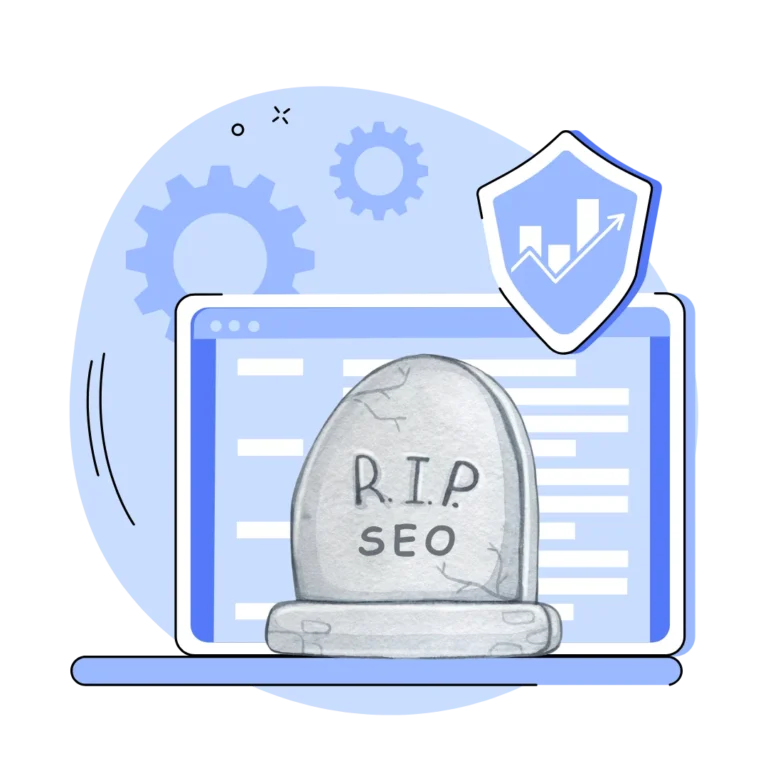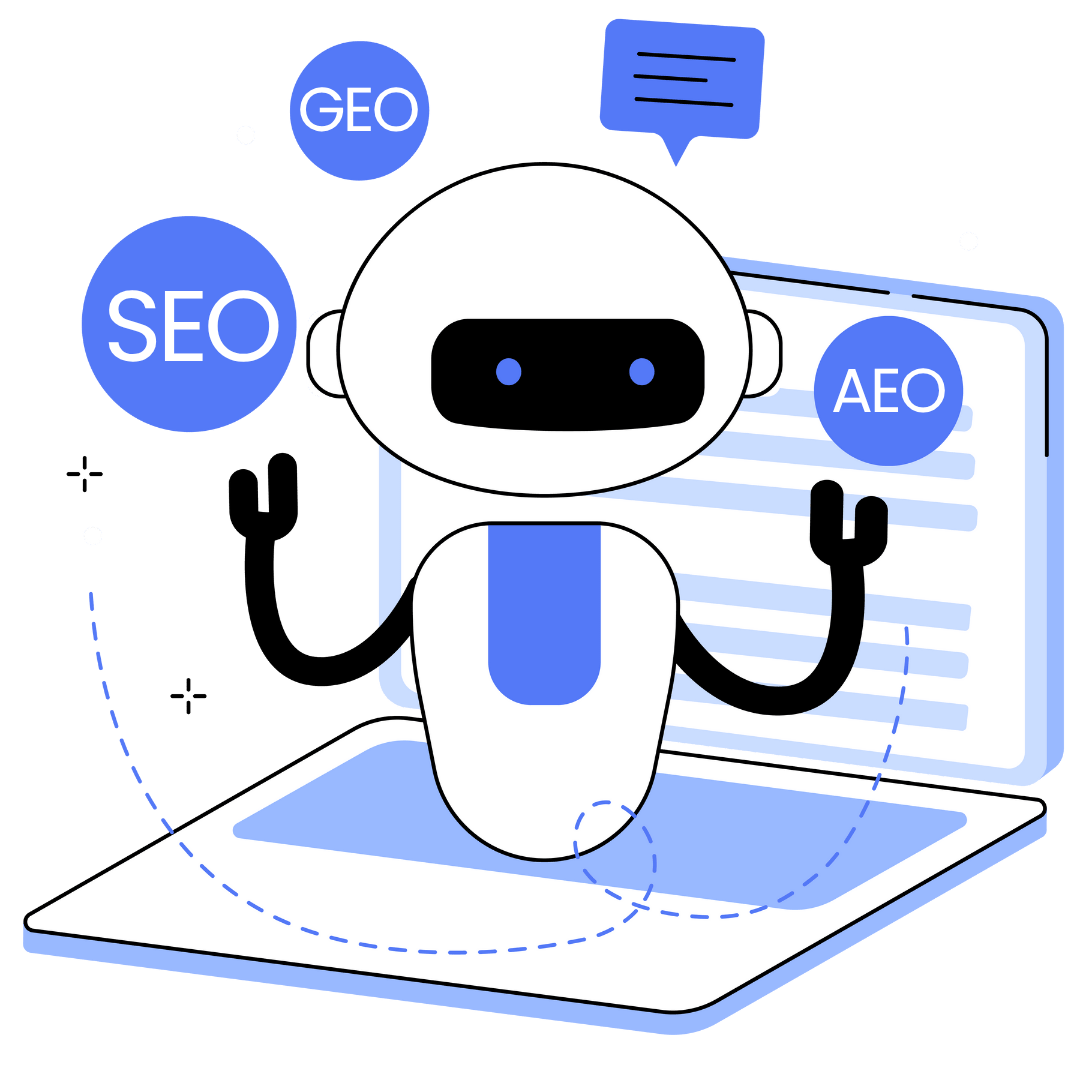Tl;DR
Everybody is saying SEO is dead because ChatGPT and other LLMs are replacing Google as their primary search platform. Yet data shows that most of the LLMs, including ChatGPT, still rely on the Google index. So, if you want to be found in an LLM world, you cannot ignore Google search. Most importantly, you will still need SEO.
The new buzzword, generative engine optimisation (GEO), is just a fancy name for SEO. Born from hype about the “end of search engines,” it paints SEO as outdated. But when we step back from the noise and look at the numbers, a different picture emerges.
This blog separates fact from fiction around the end of traditional search engines and SEO being dead.
Can ChatGPT and Other LLMs Replace Google Search?
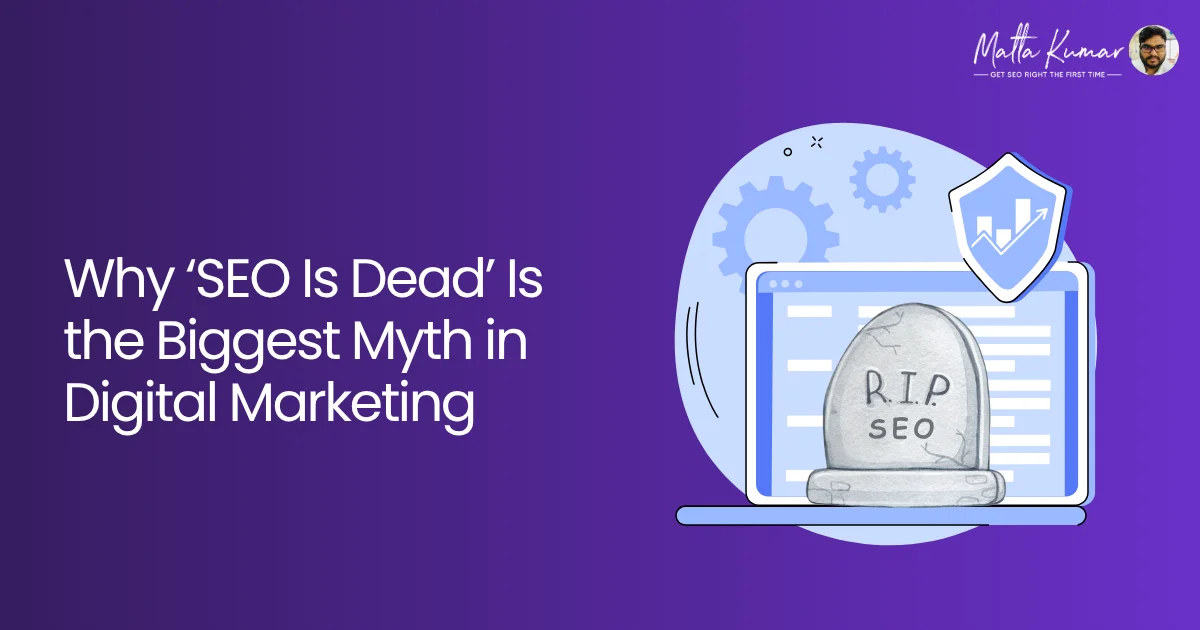
But what is the actual truth behind such claims?
ChatGPT indeed receives 5.8 billion visits every month. According to another study, the chatbot leads the LLMs in market share for maximum monthly visits. Perplexity holds the second position, with 8.2%. The other key players in the fragmented industry, like Microsoft’s Copilot and Google’s Gemini, had 4.5% and 2.2% of the market (last reviewed in March 2025).
But when we compare these LLMs’ market share with that of traditional search engines, like Google, we realise that ChatGPT and other LLMs are nowhere near replacing Google Search and others (Bing and Yahoo). However, Google Search still retains its monopoly hold over traditional search, with monthly visits amounting to 83.8 billion compared to other traditional search engines.
The most interesting part is that these AI platforms are secondary sources for Internet users. The fact that 95.3% of ChatGPT users also visiting Google attests to this statement. You might be surprised to learn that only 14.3% of regular Google search users chose ChatGPT as another search engine.
Even though ChatGPT traffic is much more engaged (61.64%) than organic search, the former remained their primary platform.
Below is a comparison infographic to show how many visitors each of these platforms received in the month of August 2025.
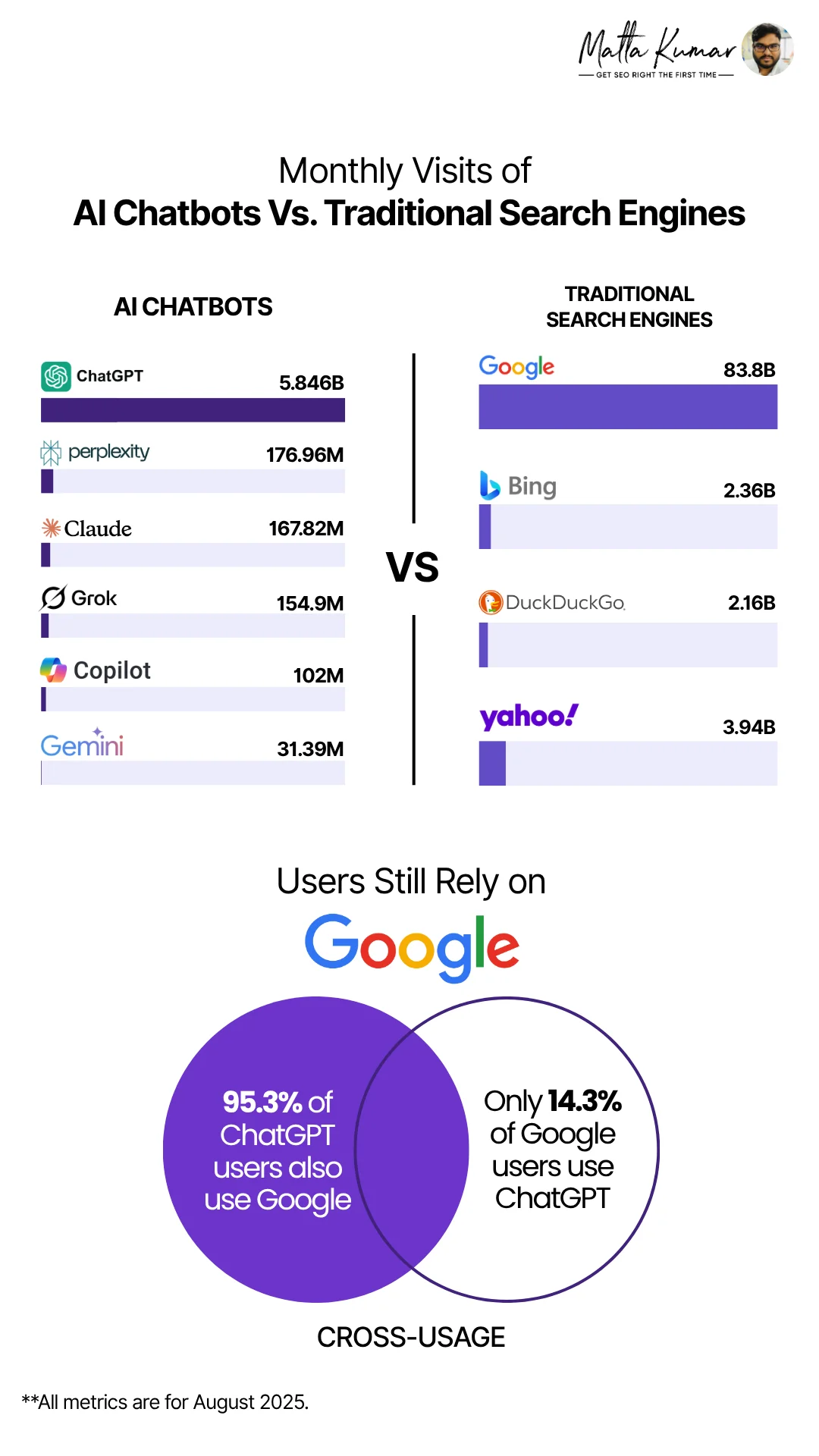
Contrarily, the September 2025 data showed a different picture. For example, Perplexity saw a dip in its website visits, while Gemini experienced a significant improvement. In September, Perplexity received 169.5M visitors while Gemini managed to cross the 1B threshold, with approximately 1.057B visits in the same month. ChatGPT experienced a slight increment in monthly visits to about 5.904B. However, the exact figure for Grok couldn’t be determined because different sources showed different estimates.
For Google Search, the monthly visits in September 2025 came down slightly to 82.6B, according to Similarweb.
Regardless of the change in the estimated figures, Google Search continues to be the primary source for Internet users. Thus, the debate on ChatGPT and other LLMs replacing Google as a preferred search engine rests, with the latter remaining as the undefeated, unsung hero among all search engines (traditional and AI Chatbots).
Do Answer Engines Use Google Search Indirectly?
Not all AI platforms own the license to use Google search results directly. Some of them circumvent the system to scrape Google SERPs using SerpApi, a company that specialises in scraping results from the search engine giant. For example, ChatGPT uses Google search results via API.
Here’s a table from a recent study showing the primary and secondary data sources for answer engines:
| AI Search Engines | Primary Data Sources | Secondary Data Sources |
 | Google Search | Digitised Books, YouTube Videos, Common Crawl |
 | Bing Search | Common Crawl, Google search, via SerpApi (limited to current event data, such as news, sports, and markets) |
 | Google Search | Content from public Facebook & Instagram posts, Common Crawl |
 | Bing Search | Common Crawl |
 | PerplexityBot | Google and Bing, via SerpApi |
 | Grok WebSearch | Posts on X.com |
 | Brave Search | Common Crawl |
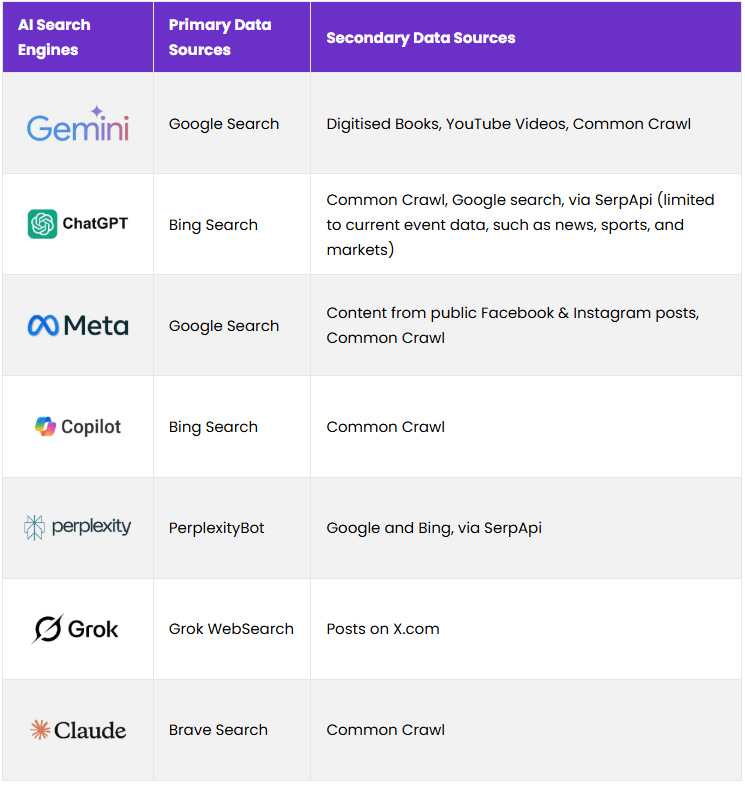
Is There a Trust Gap Existing with AI Search?
Recent reports and articles are talking about a general fatigue being observed among users from over exposure to Gen AI.
This fatigue is not only about excessive usage of AI tools for content generation but also related to the AI trust gap.
Inaccurate or misleading information has been cited by 42.1% of users as one of the primary reasons here. End users are closely split between those that think AI has worsened Google search (21.6%) to those who think it has improved (28.9%).
In order to fact-check any information, users have to visit the cited website link, however, majorly, the data mentioned in the AI Overviews summary doesn’t coincide with what is mentioned in the cited links. The same is witnessed in ChatGPT.
So – has AI really made search easier? Well, if verification is still needed, users can’t blindly rely on answer engines.
Do ChatGPT and Other LLMs Impact Website Traffic?
Both AI Mode and AI Overviews have significantly reduced click-rates for websites. The ‘zero-click’ feature of AI Overviews, for example, has eaten away traffic by 34.5%. In fact, all the answer engines do the same, i.e., siphoning organic traffic from websites.
Because of the ‘zero-click’ search, many websites saw limited traffic coming from ChatGPT and other LLMs compared to Google search, as per reports.
Here’s the breakdown:
Kindly note: These data were last updated in February 2025.
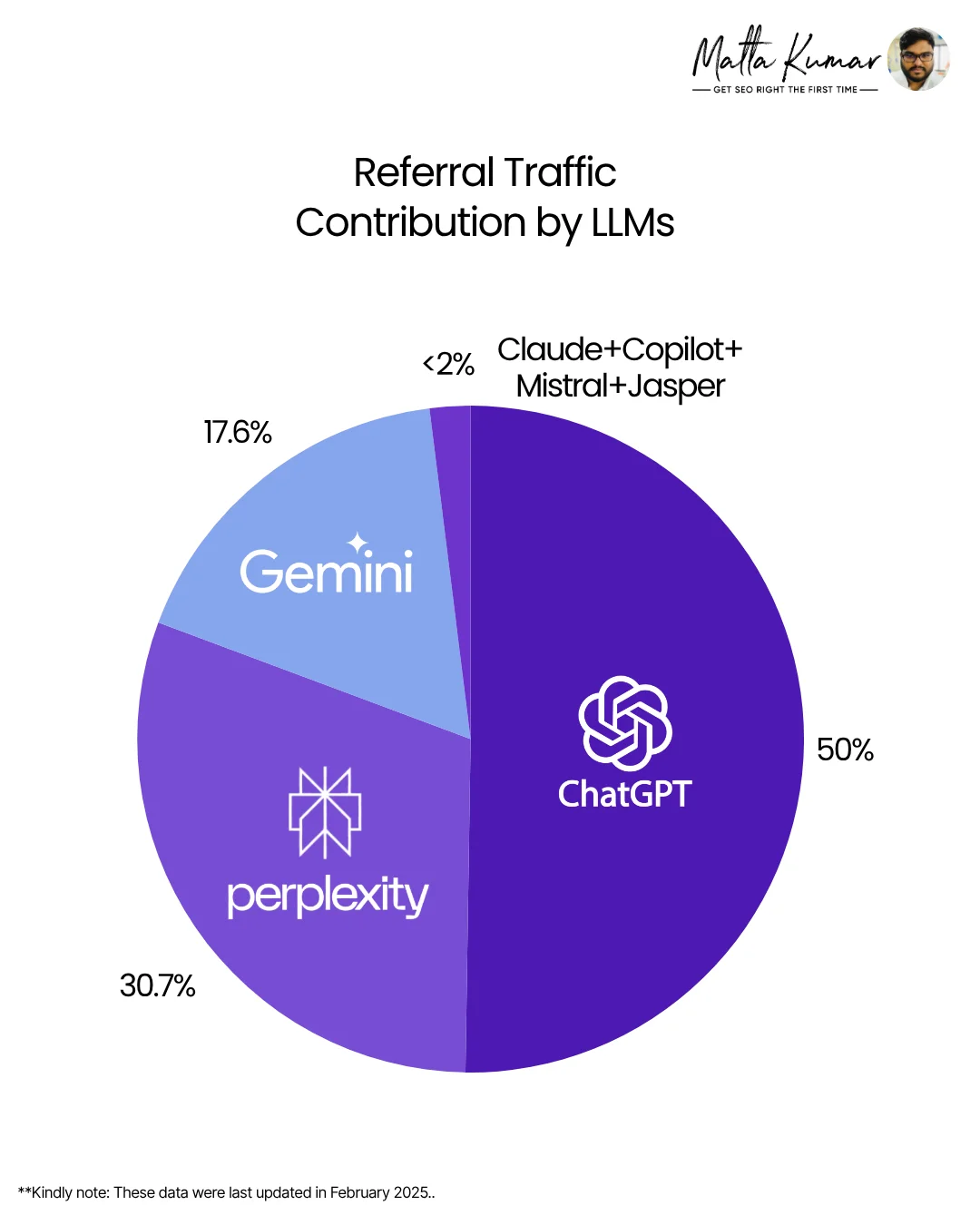
Google’s share of organic traffic for websites stands at 93.05% per month. It is still the primary source compared to other conventional search engines:
Kindly note: These are the average values from January to April 2025.
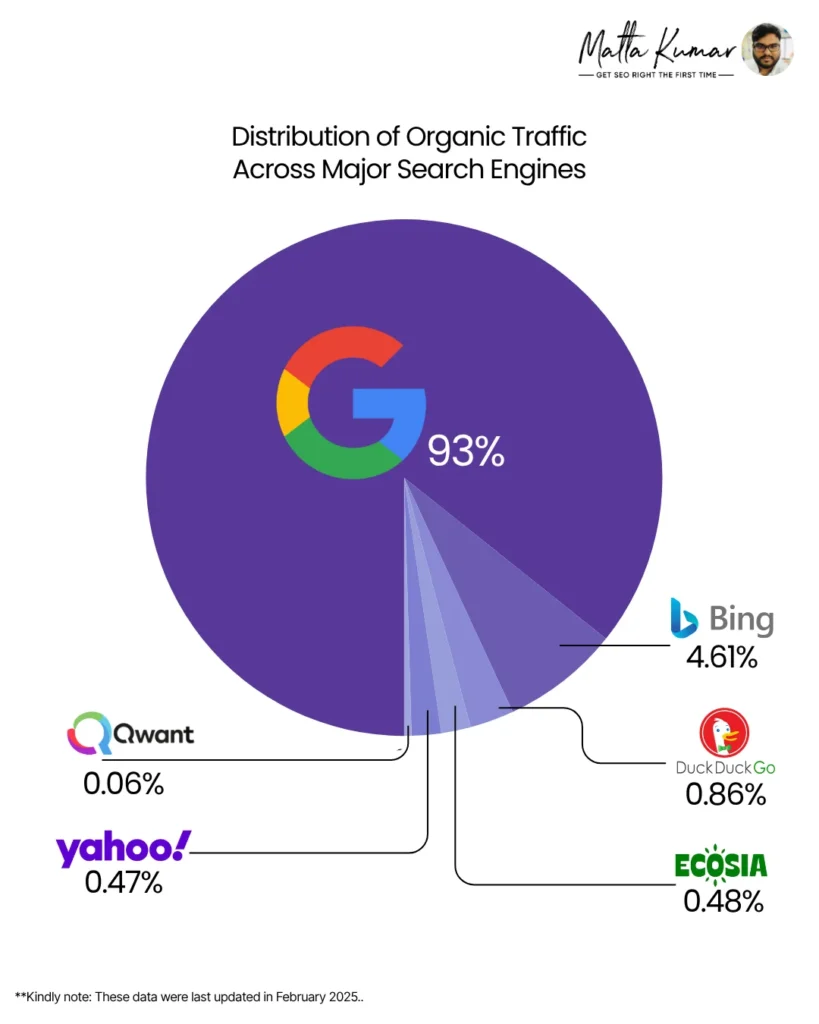
Businesses have seen a rise in impressions against click-throughs. It is unique to AI-powered search. Brand mentions can significantly improve visibility in search results. This is because AI loves to mention brands, as pointed out by Garrett Sussman, Marketing Lead, iPullRank.
Likewise, Olaf Kopp, Co-founder, Aufgesang, quoted, “In the future, large brands are likely to hold substantial advantages in search engine rankings and generative AI outputs due to their superior PR and marketing resources.”
Therefore, from a click vs. impression standpoint, AI referral traffic from ChatGPT and other LLMs are winning. Does it mean Google search lost the battle to AI Chatbots?
The answer is definitely no, and has been pointed out earlier in the article, which said people use ChatGPT alongside Google, not instead of it.
What Does This Mean for SEO?
Today, LLMs are an integral part of users’ search journey. So ranking only on Google search is not enough. You have to optimise your website for AI assistants, summaries, and conversational UIs for more visibility across the entire search ecosystem. This is where SEO plays a dominant role. It is the connective tissue between your content and what AI-powered search delivers.
The same methods are still in place but with a slight twist, meaning, you can’t follow the old playbook: Write → Optimise → Publish →Wait → Crawl → Rank → Convert.
This needs to be archived. Today, agility and multi-platform optimisation are key.
To conclude, SEO is not dead. It has evolved and will continue to do so. In simple words, as long as people use the web for searching a product/service, SEO as a visibility tool will always persist.
P.S. Additionally, don’t rely only on AI-generated content even though it is faster to curate because this is no longer caveated and users are already wary.
How Does SEO Strategy Look Like in the Age of AI?
SEO is ubiquitous. However, the rules have altered slightly, courtesy of AI influence, and also because you cannot have a one-size-fits-all approach when using different platforms to rank your website. For brands, search everywhere optimisation is the secret formula for success, which is nothing but a new ‘backronym’ for SEO. It simply means that your optimisation strategy must be adapted to the platforms you are targeting to draw visitors.
Here’s how to evolve your SEO strategy for better outcomes:
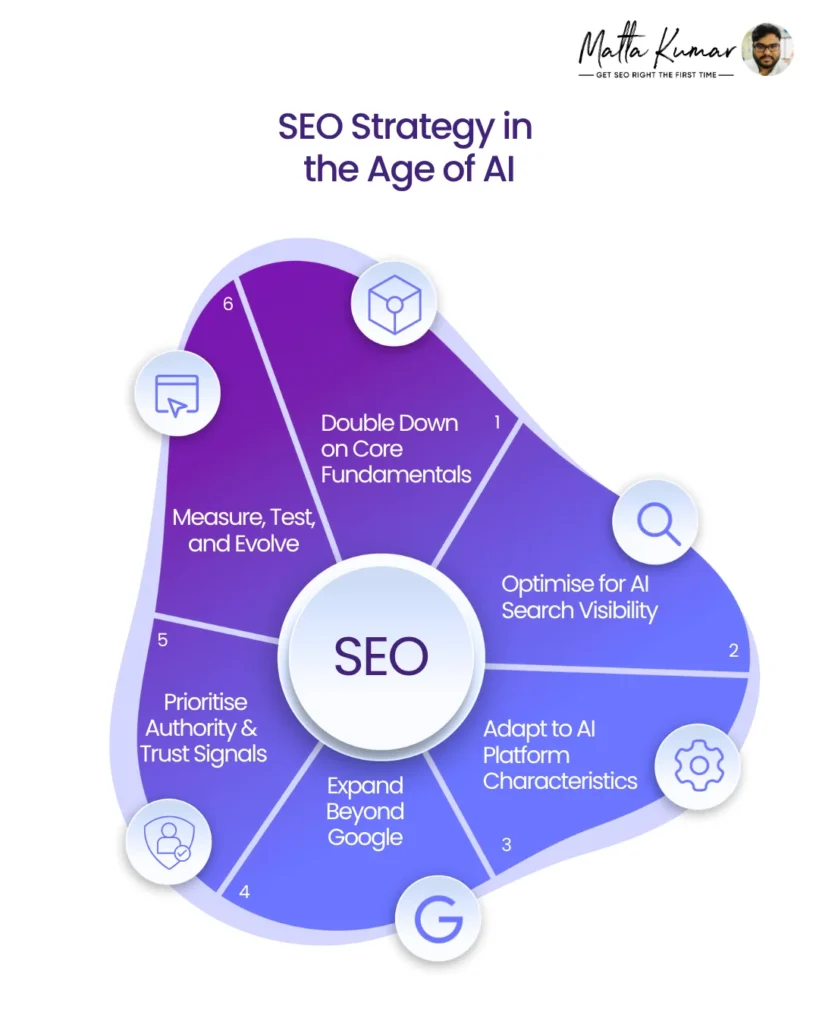
1. Double Down on Core Fundamentals
In the age of AI search, the basics matter more than ever. So begin with the fundamentals, like:
- Ensuring crawlability and indexability: Optimise your robots.txt, sitemaps, and canonical tags so both traditional crawlers (Googlebot, Bingbot) and AI agents can efficiently discover and interpret your pages. If your content isn’t crawlable, it won’t be cited.
- Maintaining strong site architecture: Keep a clear hierarchy. For example, home → category → topic → subtopic, and so on. This allows AI systems to understand content relationships easily. Logical linking boosts contextual discovery in AI results.
- Prioritising E.E.A.T.: Build expertise-driven content written or reviewed by subject-matter experts, backed by authoritative sources, and updated regularly. The stronger your E.E.A.T., the more likely AI models are to trust and reference your content.
2. Optimise for AI Search Visibility
AI assistants and generative search engines prefer clarity and structure.
- Craft concise, structured answers: Use question-based headings (H2s/H3s) and short, factual paragraphs. These formats make it easier for AI systems to extract and attribute information.
- Earn citations and mentions: Focus on getting your brand or site cited by reputable sources, industry reports, and niche communities. AI systems often surface data from frequently co-mentioned sources.
- Track AI referrals: Use analytics tools and UTM tagging to identify sessions potentially coming from AI-driven platforms like Perplexity, ChatGPT, or Bing Copilot. Even partial tracking helps understand where visibility is emerging.
3. Adapt to AI Platform Characteristics
Different AI crawlers and models behave differently. So tailor your approach as per the models. This is how you can do it:
- Recognise AI crawlers: Stay informed about user-agent updates from OpenAI, Anthropic, or Google’s AI Overviews. Allow access where beneficial.
- Format for task-based intent: AI users often seek direct actions or summaries. Create formats like step-by-step guides, checklists, and quick insights that align with their intent.
- Leverage structured data: Schema markup helps LLMs correctly ground context (e.g., FAQs, products, reviews, how-tos). The cleaner your structure, the easier it is for AI models to retrieve and summarise.
4. Expand Beyond Google
The new search frontier isn’t limited to Google’s SERPs. Your SEO strategy must include the following:
- Optimise across discovery platforms: Build SEO strategies for different discovery platforms (YouTube, LinkedIn, Reddit, and others), each acting as its own search engine.
- Target AI-driven engines: Craft content that aligns with AI Overviews, ChatGPT results, Gemini, and Perplexity’s citation patterns.
- Redefine SEO as discovery optimisation: The goal is not just ranking. It’s more about visibility, especially wherever your audience searches or asks questions, regardless of platform or AI model.
5. Prioritise Authority & Trust Signals
AI systems reward verifiable, reputable content. Focus on the following elements more:
- Earn strong backlinks: Secure links from trusted, niche-specific domains. They serve as credibility signals not just for Google, but for AI retrieval algorithms.
- Build author authority: Maintain detailed author bios, LinkedIn profiles, and schema attributes (like author and reviewed by). AI prefers to cite identifiable experts.
- Leverage social proof: Ratings, reviews, and brand mentions across platforms help AI gauge authenticity, reinforcing trust in your content.
6. Measure, Test, and Evolve
Continuous adaptation is the new SEO superpower. So, do not skip the following points:
- Monitor traffic from AI systems: Tools like Similarweb and Ahrefs now indicate traffic sources tied to AI or “direct discovery.” Track fluctuations to gauge exposure.
- Identify what AI cites: Analyse which of your pages or competitors’ content are referenced in AI answers. These patterns reveal ideal content formats.
- Test and iterate: Update based on new AI search behaviours. Run A/B tests for snippet formatting, FAQs, and summaries.
- Use TL;DRs: Include concise summaries or key takeaways in articles. Thy are highly favoured by AI models for quick extraction and referencing.
- Limited Real-Time Data – Many AI and free keyword research tools can’t provide up-to-the-minute search volume or trend insights. Cross-check results with live data sources like Google Keyword Planner or Google Trends.
- Inaccurate Search Volume Estimates – Even the best keyword search tool may show approximations rather than exact numbers. In that case, multiple research tools should be used to compare data for a more reliable view.
- Lack of Competitor Insights – Some free tools lack a competitor gap analysis feature. So pick the ones that support the same, e.g., Semrush or Ahrefs.
- Overlooking Search Intent—Tools may list high-volume terms without indicating user intent. Pair your SEO keyword planner with AI chatbots to understand and match the context to the intent.
- Difficulty Finding Niche Keywords—Even the best tools can miss long-tail, niche opportunities. Use a free AI keyword generator, like ChatGPT, to expand into conversational and niche terms.
Conclusion
This article provides two inferences: a. Google still dominates search b. SEO as a strategy will continue.
So no, AI didn’t hand over the death sentence to SEO. In fact, AI has pushed SEO to the next stage in its evolution. Simply put, businesses will need visibility as long as users are searching the internet. And SEO remains the strategy that connects audiences to answers, regardless of what it is now to referred to as – be it SEO, GEO, or AEO.
As an SEO professional, you need to simply adapt the optimisation strategy to AI-powered search as well, just like you did for mobile-first, voice search, and endless algorithm updates.

